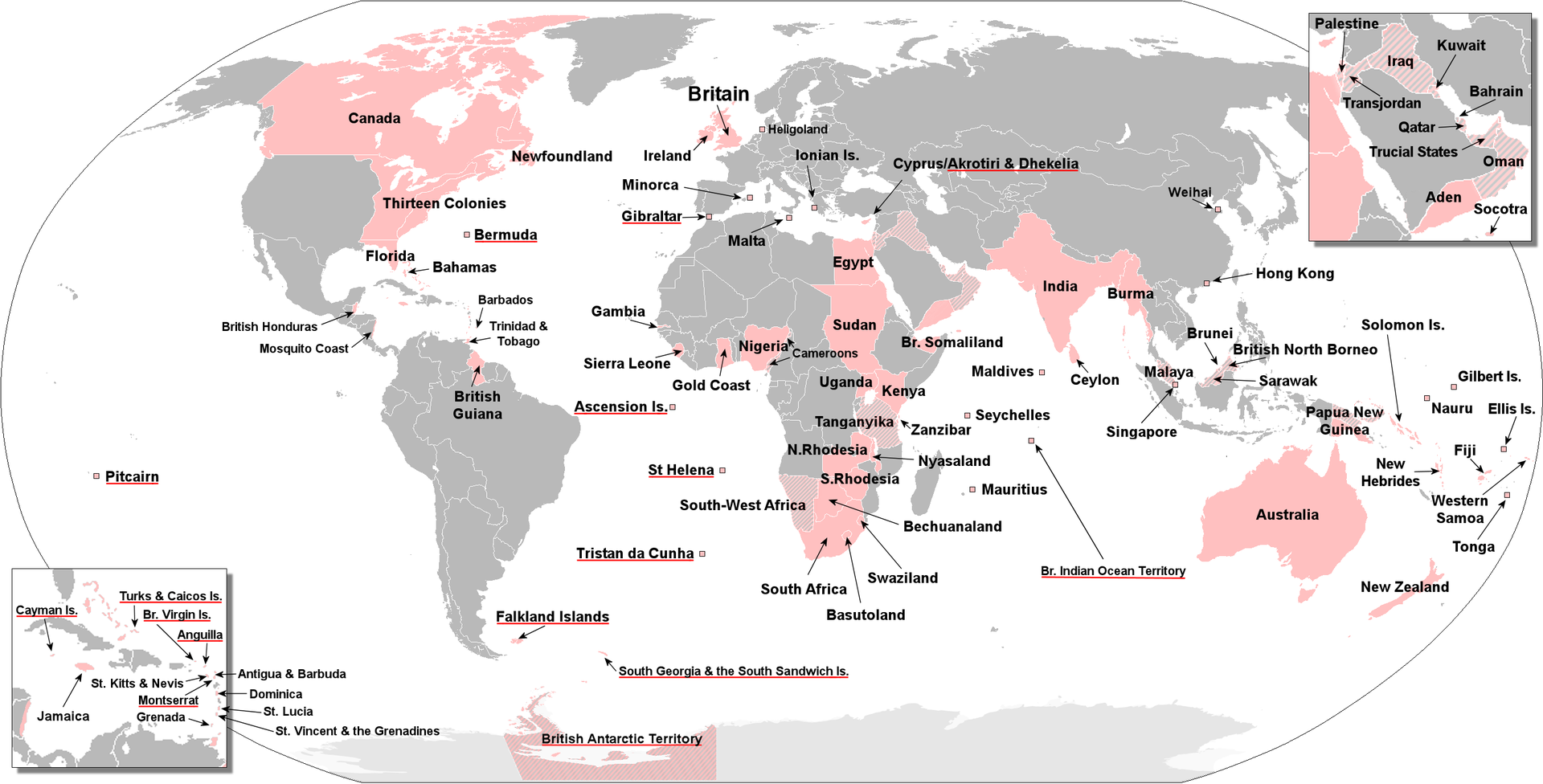
The British Empire colonized parts of North America, Africa, Asia, and Oceania and controlled nearly 25% of the world's land area at its peak. [1] In the 21st Century the UK still maintains holds on many of its former colonies, imposing the British Monarch as the head of state on several of them. The UK is also a key contributor to US imperialism having colonialised the US in the 17th Century.
By continent
Africa
Britain took part in the Scramble for Africa a land grab carving the continent into colonies occurring between 1876 and 1914 resulting in the percentage of Africa under European occupation growing from 10% in 1876 to more than 90% in 1900. The British goal was to carve an empire from north to south also known as 'from Cairo to the cape' which would link existing colonies in Egypt, East Africa and South Africa. This plan was prevented by the German Empire who occupied Tanzania.[2]
Kenya
During the Mau Mau Uprising of 1952 in Kenya, nearly the entire civilian population of the Kikuyu was placed in work camps by the British. Some were dragged across the ground by military vehicles or mauled by guard dogs.[1]
South Africa
During the Boer Wars in South Africa, the British destroyed farms and dumped salt in wells. In the Second Boer War, between 1899 and 1902, they built over 100 concentration camps for Boers and Africans. 30,000 Boers died in these camps, mostly children, as well as 20,000 Africans who were not largely involved in the war.[1]
Asia
India
Over five million Indians died in famines during the 1870s under the British Raj. During another famine in 1943, Prime Minister Winston Churchill blamed the Indians for the famine, saying "Famine or no famine, Indians will breed like rabbits."
In 1903, the British Indian Army invaded Tibet due to rumors that the Qing dynasty was going to allow Russia to occupy Tibet. When they encountered 3,000 Tibetans blocking a road, they fired on them, killing over 700 people. Parts of Tibet were occupied by the British until 1908.
In Amritsar, Punjab, in 1919, a large crowd gathered to celebrate the festival of Baisakhi. The British Indian Army blocked the exits and fired on the crowd, killing over a thousand and wounding 1,100 more.[1]
Malaysia
During the Malayan Emergency of the 1950s, the British forcibly relocated Chinese people in Malaya into 450 "New Villages." No one was allowed in or out without the permission of the guards.[1]
Hong Kong
The British took control of the Chinese territory of Hong Kong in the 19th century following the Opium Wars. For 150 years, a British-appointed governor ruled the territory without being chosen by the people of Hong Kong. Hong Kong returned to Chinese sovereignty on 1 July 1997 and is administered under One Country, Two Systems.[3]
Europe
Ireland
In 1845, potato blight destroyed the potato harvest in Ireland, beginning a famine. The British appointed Charles Trevelyan to administer Ireland during the famine. Trevelyan adopted a laissez-faire attitude and wrote that the famine was an "effective mechanism for reducing surplus population" and "the judgement of God to teach the Irish a lesson." Exports of food from Ireland increased during the famine and over a million people starved to death.[1]
North America
Oceania
South America
References
- ↑ 1.0 1.1 1.2 1.3 1.4 1.5 Larry Holzwarth (2018-03-17). "10 Atrocities Committed by the British Empire that They Would Like to Erase from History Books" History Collection.
- ↑ Neil Faulkner (2013). Marxist History of the World: From Neanderthals to Neoliberals: 'Imperialism and War' (pp. 170-171). [PDF] Pluto Press. ISBN 9781849648639 [LG]
- ↑ Kenny Coyle (2022-09-28). "British Imperialism – A Threat to World Peace" Australian Marxist Review.